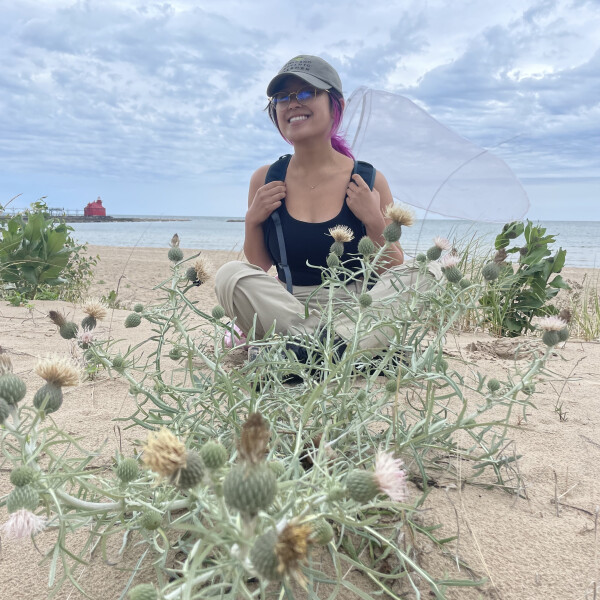
Uncovering the floral scent profile and night-time pollinator of Pitcher's Thistle 2023
Sturgeon Bay, Wisconsin for 3 Weeks (June 24-July17th)
Ecology, GIS, Population Biology, Reproductive Biology, Fieldwork, Plant Morphology, Entomology, Pollinator Networks, Bees, Moths, Insect Identification
Uncovering the floral scent and night-time pollinators of Pitcher’s Thistle
This summer, we will be studying the rare and threatened plant: Pitcher’s Thistle (Cirsium pitcheri). Pitcher’s Thistle is threatened by an invasive beetle predator: Larinus planus. So far, we know that L. planus destroys seeds of Pitcher’s Thistle. Our objective this summer is to see if Larinus planus also changes the pollinator visits and floral scent profile.
Our research questions are:
Does Larinus planus predation relate to changes in floral scent in Pitcher’s Thistle?
Does changes in floral scent also attract pollinators differently?
This second part of the research will be conducted at night. So far, we don’t know if Pitcher’s Thistle is pollinated at night. We suspect that Pitcher’s Thistle might be pollinated by moths. We will be using infrared night-time goggles to observe potential moths who visit the elusive plant.
This research will be mostly field research where we collect floral scent and identify insects!You would learn how to collect sensitive scent samples. In lab, you will also learn how to properly preserve and pin insects. The field site is in Sturgeon Bay, Wisconsin. Pitcher’s Thistle occurs only in the Great Lakes Dunes, next to the beach. We will be staying in a Wisconsin cabin so both room and food will be covered communally. The research assistant will potentially have to share a room with a roommate.
You would be suited for this research if:
- You are interested in Moths, Bees, and Beetles!
- You’d like to learn how to preserve insects properly for research grade.
- You are interested in rare plant conservation
- You are willing to have long days in the field (5-6 hours every weekday)
- You like the beach (dune habitats)!

